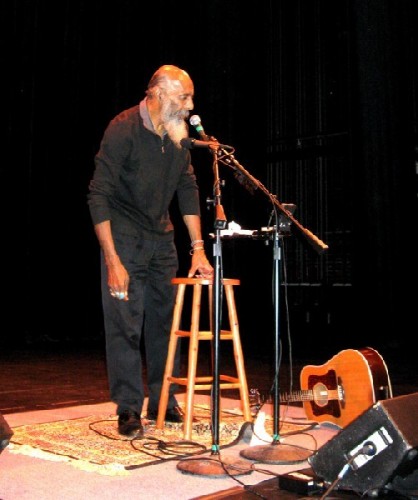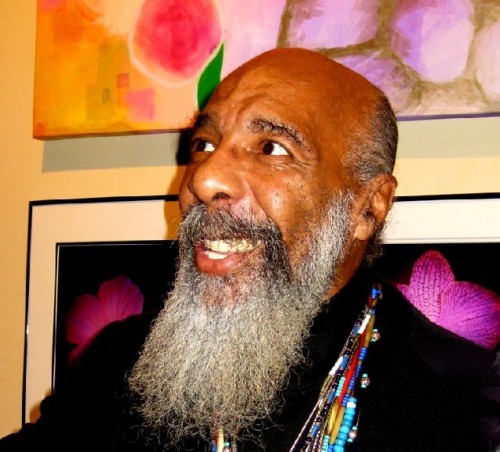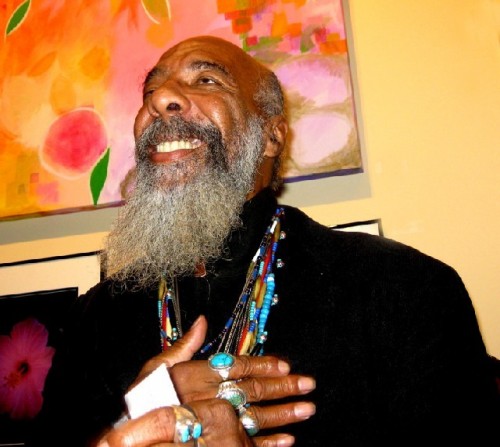Richie Havens at Carnegie Hall
A Woodstock Update, Fresh as Ever
By: Susan Hall - Feb 23, 2010
Richie HavensZankel Hall, Carnegie
February 9, 2010
accompanied by
Walter Parks, Guitar
Richie Havens seems as fresh to the Carnegie audience today as he did to the 400,000 people gathered in Bethel, New York for the Woodstock Festival decades ago. The message that Havens delivered at Woodstock, not that freedom was coming, but that it was here, seemed just as apt now. Our current world is made up of doctors, nurses, lawyers, judges and police officers who were all at Woodstock. "Sometimes music can pick you up and take you away," Havens says about improvising his most famous song, "Freedom." This night at Carnegie, Havens did pick us up and take us away.
Havens had left New York at 5:30 am on the first morning of Woodstock. If he hadn't left before dawn, Richie never would have made it to the festival. He was in a Howard Johnson's Motel with other musicians about seven miles from the event. There was no way to travel those seven miles by car. By concert time, all the access roads were blocked. Concert goers had abandoned their cars on a road, packed to a standstill with vehicles and people. The crowds walked the rest of the way. Havens' bass player had to walk twenty miles..
A farmer arrived in a bubble helicopter and Havens was loaded on. Even though he was fifth in the performing lineup, he was now to go first, because he had the smallest group with the fewest instruments and could fit in the only transportation able to get in.
Looking through the helicopter's floor at the people gathering below, Havens said, "...this time they're not gonna be able to hide us. They're not gonna be able to make it look like a little thing. We had numbers this time. I could see that from the air. This time we were going to make news in a new positive way." Havens had the first best view of Woodstock and, because he was there, the fields came alive with the sound of music.
Havens is an original in every way. He took the 'bottleneck' method used to tune the blues guitar and adapted it to the Open Tuning Bar Chord Method. He had learned to play by watching others. When he tried to copy them, he got tired of all the different finger positions. He almost gave up until he figured out that by changing the tuning of a few strings, he could make a complete chord without pressing down on the fret at all. "It took me ten seconds to realize I could slide my thumb along the neck of the guitar to make different chords at every fret stop." In YouTube commentary, guitarists note that this is not as easy as it sounds. Creating a sound like Havens is another matter.
"Here Comes the Sun" was backlit with three glowing yellow suns. "I got a telephone in my bosom and I can call him from my heart," makes your hair stand up on end it's so good.
"Freedom", his final encore at Woodstock where he had been kept on stage for three hours, was improvised because Havens had run out of songs. It was the fastest song ever written, an instant classic. He wove the old spiritual "Sometimes I feel like a motherless child" into the chant. Interpreting the connection between 'Freedom' and a 'motherless child,' Havens has written: "We are all motherless children in some sense of the way life is. That is an equal, harder side to freedom a sense of aloneness, a sense of the vastness of our individual opportunity to do just about anything in the universe. we all feel that burning need to inhale freedom...a basic cornerstone to human life." The song has about a million and a half hits on YouTube, right up there with the Beatles. The last line of the spiritual is "going to get down on my knees and pray," and that Havens did at the conclusion of the concert. We could see what alone but reaching out is.
Returning to the hotel on that long ago Woodstock day in an Army helicopter, Havens saw the guitarists sitting in a line on either side of him, leaning on their instruments like they were rifles, the guitar necks straight up in the air. "I was seeing what Woodstock was all about. The new army. We're the new army." Havens points out that in this army, we are all related. His dignity, his musicality, his quiet message resonated at Carnegie.
WFUV Fordham University co-sponsors these programs with Carnegie, including Elton John, REM, and an upcoming tribute to The Who on March 2nd at Carnegie. www.carnegie.org







